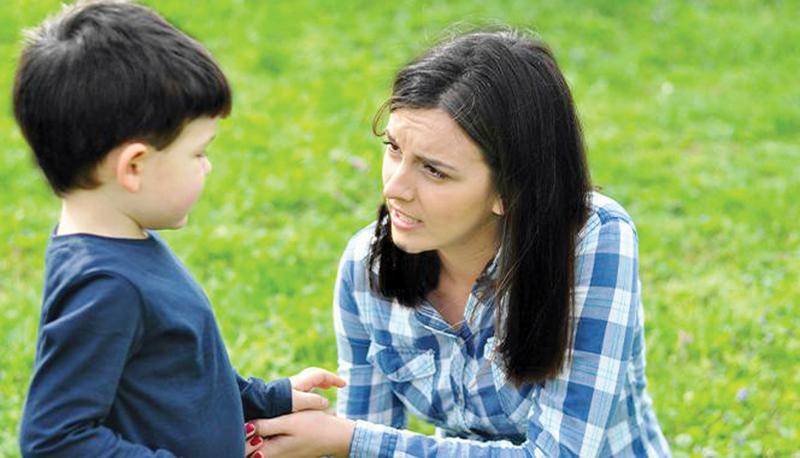
Children’s days are filled with lessons, whether it’s maths at school or their parents telling them to eat with their mouth closed.
However, a new study has found that children as young as six start to question what they are being told by adults, by seeking out additional information or testing the claim.
The study by researchers from the University of Toronto and Harvard University investigated if and why children begin to question what they are told by authority figures.
They found that most study participants, between the ages of four and seven, tested surprising claims made to them by adults.
Better understanding
However, older children demonstrated a better understanding of how to properly explore and verify the claim, showing an increased awareness of their own doubts.
‘The research shows that as children age, they become more sceptical of what adults tell them,’ said Samantha Cottrell, from the Childhood Learning and Development Lab at the University of Toronto.
‘This explains why older children are more likely to try to verify claims and are more intentional about their exploration of objects.’
Young children are known to learn through observation, experimentation and by what they are told by others.
The latter is especially true of adults, like parents or teachers, who they see as authority figures.
When the children learn something surprising or conflicting, they will seek out additional information by asking questions or by testing claims experimentally.
Research has shown that the older children get, the more likely they are to try and verify the claims, particularly over the age of six.
Latest research
The psychologists carried out two studies, published recently in Child Development, to investigate why children seek out information in response to being told something surprising by adults.
In the first study, 109 children between the ages of four and six were presented with three familiar objects: a rock, a piece of sponge-like material and a hacky sack. An experimenter would then ask the children ‘do you think this rock is hard or soft?’, to which they all responded that it was. They were then told something that either supported or contradicted this belief, before being asked again if the rock was hard or soft. Almost all the children responded with what they were just told by the experimenter. The experimenter then left the children to explore the object on their own, and their behaviour was recorded
In the first study, 109 children between the ages of four and six were presented with three familiar objects: a rock, a piece of sponge-like material and a hacky sack.
An experimenter would then ask the children ‘do you think this rock is hard or soft?’, to which they all responded that it was hard.
They were then told something that either supported or contradicted this belief, like ‘that’s right, this rock is hard’ or ‘actually, this rock is soft, not hard’.
The children were then asked again if the rock was hard or soft, and almost all the children responded with what they were just told by the experimenter.
The experimenter then left the children to explore the object on their own, and their behaviour was recorded.
Most children who were told that the rock was soft engaged in testing surprising claims by reaching out to touch it.
According to the researchers, this could show children’s ability to use exploration to test more complex claims increases as they age.
Their motivation for testing the claim may also change, as younger children could be exploring what they were told out of a desire to experience the surprising event.
However, older children could be exploring because they were sceptical of what they had been told.
The second study
The second study involved telling 154 children between the ages of four and seven over Zoom that an adult had made a surprising claim.
The children were then asked what another child should do in response to that claim and why they should do that.
Six and seven-year-old children were more likely than younger children to suggest an exploration strategy tailored to the claim they heard, as opposed to offering none or an unrelated exploration.
For example, when they were told ‘the rock is soft’, the older children were more likely to suggest touching the rock. When told ‘the sponge is harder than the rock’ they would suggest touching both the sponge and the rock in response.
The results also show that children increasingly justify their exploration as a means of verifying the adult’s surprising claim as they age.
This suggests that they are becoming more aware of their doubts about what adults tell them, so their exploration strategies becomes more intentional, targeted and efficient.
‘There is still a lot we don’t know,’ said Samuel Ronfard, assistant professor at the University of Toronto.
‘But, what’s clear is that children don’t believe everything they are told. They think about what they’ve been told and if they’re sceptical, they seek out additional information that could confirm or disconfirm it.’
- Daily Mail.uk
****
CHILDREN ASK THEIR PARENTS MORE THAN 200 QUESTIONS A WEEK
Inquisitive children ask their parents an average of more than 200 questions every week and often leave them having to search online for answers, a survey has found.
The study found that the most asked questions involve Father Christmas, and include, ‘How old is Father Christmas?’ and ‘Who gives Santa presents?.
Other popular subjects included questions about animals which are asked by 47 percent of children, maths asked by 45 percent and spelling asked by 41 percent.
But the survey of more than 2,000 parents of children aged three to 12 in the UK, found that an incredible 61 percent were often asked questions they did not know the answer to.
